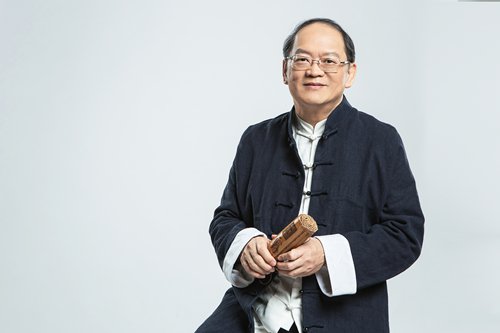While Confucianism remains one of the world's most recognized icons of Chinese culture, the way many people today interpret the more than 2,000-year-old philosophy is biased, Taiwan scholar Fu Pei-jung said in a recent interview with the Global Times.

Fu Pei-jung Photo: Courtesy of Beijing Xiron Books Co, Ltd
First proposed by ancient Chinese philosopher and politician Confucius (551BC-479BC) and later further developed by his disciple Mencius (372BC-289BC), Confucianism, also known as Ruism, has remained the most influential system of philosophical, ethical and political thought in China since the establishment of the Qin Dynasty(221BC-206BC), China's first empire.
"Many people today tend to discuss Confucianism either outside of its original context or based solely on the works of Song (960-1279) and Ming (1368-1644) dynasty scholars," said the 68-year-old Yale philosophy PhD degree holder, who spent the past 50 years studying Western and traditional Chinese philosophy.
His new book Fu Pei-jung Talks about Confucius was published in the Chinese mainland in May by Beijing Xiron Books.
"For example, people often mention 'men are born to be good-hearted' as part of Confucius' ideas about humanity, but that is actually the point of view of Song Dynasty Ruist philosopher Zhu Xi (1130-1200) rather than an actual quote from Confucius or Mencius," Fu noted.
Also, it is very unlikely that Confucius and Mencius, who focused the need for self-improvement, would have agreed to such a view, said the Taiwan University professor.
In recent years, Fu has frequently appeared as speaker on hit Chinese mainland shows to educate the public about traditional Chinese history and culture, such as China Central Television's Bai Jia Jiang Tan (The Lecture Room) - a result of "guoxue fever," a nationwide movement to reinvigorate traditional culture that started about a decade ago.
Copying the past
The term guoxue refers to China's ancient literary and philosophical classics, ancient etiquette and rituals as well as studies about traditional Chinese clothing and items.
Many Chinese parents today send their kids clad in ancient Chinese clothing to pricey classes where teachers, also dressed as their predecessors did in feudal private schools, teach children to move their heads to the rhythm as they recite from Confucian classics just like ancient scholars did. There were more than 3,000 of these schools in China in 2013.
"Studying tradition is proper and good, but dressing kids in ancient clothing and making them perform traditional rituals are a bit out of touch with modern life," Fu told the Global Times.
"Without sincerity, all these practices are superficial and cannot really help children apply what they learn to real life," he noted, explaining that it makes no sense to have a child memorize ancient texts if they don't know what it means.
"So when studying guoxue we should focus more on understanding the ideas [of the ancient philosophers] rather than just memorizing rituals," Fu said.
Overseas Confucian studies
Sharing his opinions about overseas Confucian research, Fu said that while overseas scholars have contributed to the study of Confucian history, research on the whole is of limited academic value.
"Experienced in dealing with historical documents, overseas Confucianism scholars have carried out in-depth studies about the historical background of Ruism as well as the authentication of Confucian documents," Fu said.
However, to Fu, the way that many Western scholars divide the 20 chapters of the Analects of Confucius, one of the first works of Confucianism, into two parts during their studies is rather subjective.
"Western scholars often say the last 10 chapters were not originally part of Ruism because those chapters use Kongzi yue (the master Confucius said) instead of zi yue (The master said) like the first 10 chapters do," Fu said.
"I think this type of research neglects the consistency of the philosopher's thoughts and character, but Western scholars think it is important," Fu told the Global Times.
Especially when it comes to studies concerning the concepts and ideas of Confucianism, "there are limitations in Western scholars' research in this respect as they often hold preconceived views when they're trying to explain Confucian ideas," Fu said.
Moreover, he pointed out that the fact that Confucianism studies are often categorized under Asian and African studies in European colleges shows that the subject is not given enough attention.
Also, since overseas Confucian studies and research are often written and taught in foreign languages, barriers to translation are unavoidable.
"That leads to difficulties to explain the meanings of the original text, such as the Confucian idea of ren, which is untranslatable," Fu said.
According to Fu, it is best to just use pinyin in translations for the term, often translated as benevolence or humanity in English, but even when this happens it is often bracketed with "tons of explanations that make it even harder to understand," creating yet another roadblock to introducing Confucianism to the West.


